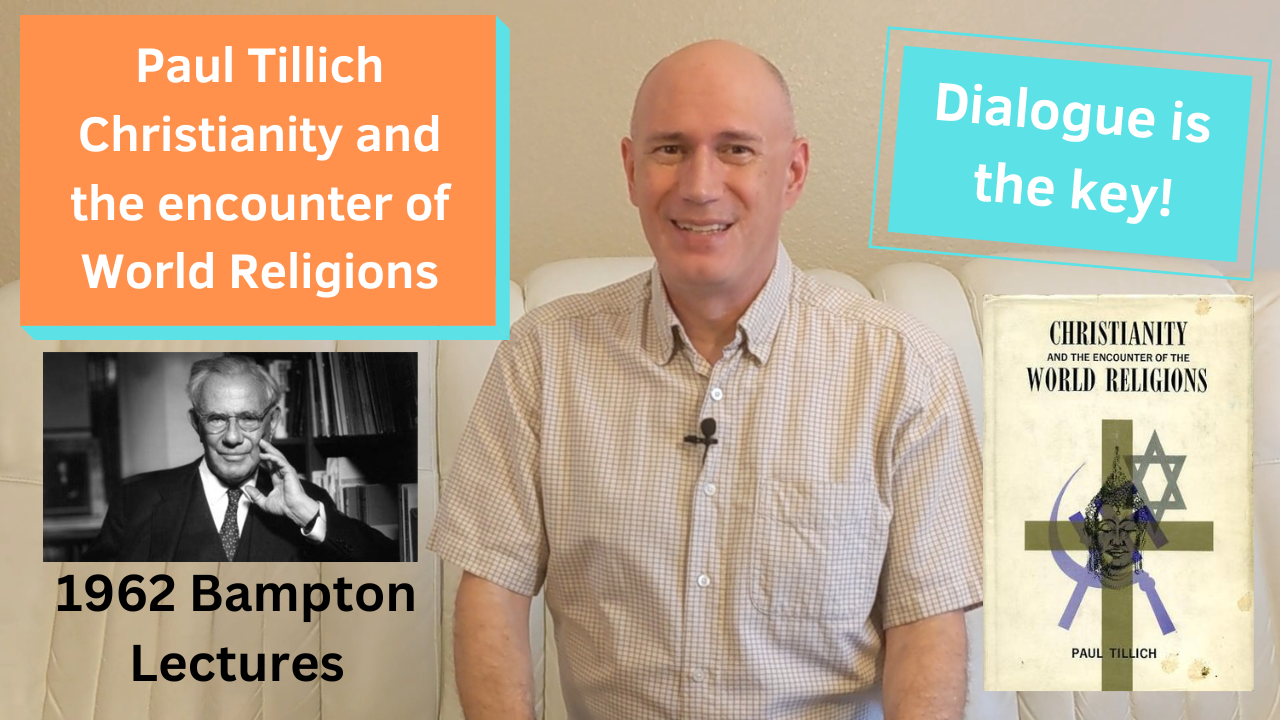03/15/2023 – Paul Tillich Christianity and the Encounter of World Religions

Paul Tillich’s Christianity and the Encounter of the World Religions was written late in his life. There’s some fascinating stuff going on in this short piece, and guess what? We’re going to take a look at it. Check it out. This is TenOnReligion.
Hey peeps, it’s Dr. B. with TenOnReligion. If you like religion and philosophy content one thing I really need you to do is to smash that sub button because it really helps out the channel. The transcript is available at TenOnReligion.com and new episodes are posted about every two weeks, at noon, U.S. Pacific time, so drop me some views.
The 1962 Bampton Lectures at Columbia University in New York City were delivered by Paul Tillich in the fall of 1961 and shortly thereafter published in 1963 with the title of Christianity and the Encounter of World Religions. The four lectures represent the four chapters in the book. For those of you who aren’t that familiar with Paul Tillich, he was a philosopher-theologian who taught in Germany and fled in 1933. He taught in a number of universities in the United States, most notably Union Theological Seminary, Harvard Divinity School, and the University of Chicago. He spent eight weeks in Japan in the summer of 1960 and this experience fundamentally changed his views. These lectures are in part an expression and outgrowth of that change. Let’s take a look at these four chapters in this book and see what they have to say.
Chapter 1 is titled, “A View of the Present Situation: Religions, Quasi-Religions and Their Encounters.” The main idea is that Christianity's basic challenge today is how to encounter what he labels as "quasi-religions" such as fascism, communism and liberal humanism, and the secularism they present. He labels them quasi-religions because he thinks there is some level of genuine similarity between them and other things we categorize as religion. The radicalization of nationalism is fascism and the radicalization of socialism is communism, and in both, according to Tillich, the national and social concerns are elevated to ultimacy, thus they can be considered religious. Technological invasion of traditional cultures brings religious indifference, but it cannot last because the question for the meaning of life is always lurking in the background. Nations must have not only a natural self-affirmation, but also a vocation or purpose to spread and defend something they deem ultimate. If they become unbalanced on the side of the natural self-affirmation, they quicky become corrupt, and that’s when radicalization sets in.
Chapter 2, “Christian Principles of Judging Non-Christian Religions.” In this chapter Tillich contends that Christianity has a long constant thread of universalism that affirms the revelatory experiences of non-Christian religions. This starts from the Hebrew Bible prophets on through Jesus and is interrupted during the Crusades' opposition to Islam and the rise of anti-Jewish impulses, but then is picked again in the Renaissance and the Enlightenment. Tillich starts off by stating that if an individual or a group is convinced that it possesses a truth, it automatically denies any claims which conflict with that truth. It's not about the rejection itself but the nature of that rejection. It can be a total rejection, partial rejection, or a dialectical union of rejection and acceptance. Though there are prominent examples of the first two, for much of Christian history, Christianity’s relationship towards other religions has been more along the lines of the last option. This brings up the question, do things like justice, mercy, or love transcend the exclusivity of any particular religion, including Christianity? However, in the medieval era the wars between Islam and Christendom forced Christianity to become radically exclusive. A by-product of this new self-consciousness included a deepening of the backlash against Judaism as well. By the time of the Renaissance, though, a new trend emerged with Protestant Reformers like Erasmus and Zwingli and continued on into the Enlightenment with figures like Kant. Christianity must be reasonable and if there is a universal concept of religion, perhaps other traditions share it. But in some times and places the concrete element rose up against this universal element and labeled other traditions as false religions. For example, Karl Barth’s response successfully insulated Christianity from Nazism but created an incredibly narrow view towards encounters with other religions which became prevalent among many Protestant leaders and groups worldwide. On the other side was Troeltsch, whose idea of a cross-fertilization with other religions was actually closer to New Testament concepts like the idea of the Logos. With regards to the quasi-religions, Protestantism remains open to the danger of nationalism (hello, recent U.S. history), and is generally less interested in social justice than something like Roman Catholicism.
Chapter 3, “A Christian-Buddhist Conversation.” Here Tillich suggests the best way to compare different religions is by a "typological" approach that is based on looking closely at each religion's major symbols and how they manifest certain universal "polarities" (instead of the Hegelian "antitheses"). By doing so one can reveal the points where they converge and diverge without pushing something into the past when it is dialectically left behind. Even though religions grow and die, the forces which brought them into being are part of the nature of humanity and the self-manifestation of the divine. We find this in various mystical and ethical experiences in relation to a telos. What is the aim? In Christianity, Tillich suggests it is the Kingdom of God and in Buddhism it is nirvana. In one the ultimate is symbolized in personal categories and in the other transpersonal categories. It seems as if the dialogue may be at an impasse, yet it continues. There have been Christian mystics who talk about “being-itself” and Buddhist spiritual leaders who believe the Buddha spirit can manifest itself with personal character. Perhaps the telos symbols are not necessarily mutually exclusive. Tillich suggests the same can be said for ethical experiences as well.
Chapter 4, “Christianity Judging Itself In the Light of its Encounter.” In this final chapter Tillich suggests that each encounter with another religion involves Christianity judging itself. The criteria for such judgment stem from "the appearance and reception of Jesus of Nazareth as the Christ, a symbol which stands for the decisive self-manifestation in human history of the source and aim of all being." So, basically we judge Christianity in the name of Christianity. Let’s explain. Participation in the past isn’t based on hyper-accurate historical knowledge, but rather on the ability of one to be grasped by the spiritual power of historical events. In Christianity, the particular was crucified for the sake of the universal. Jesus wasn’t crucified for the people only of his time, but of all time. When the particular and concrete symbols are elevated above the universal tendencies, Christianity becomes limited, especially in its ability to interact positively with other religions. There are multiple examples in history where there have been some degree of both acceptance and counter-judgment between Christianity and other religions. It’s not about an attempt to mutually convert one another, but a mutual asking of what is it that truly makes religious experiences attractive? Dialogue is the key to breaking through religious particularity and reaching religious freedom. In this way one can then see the spiritual presence through other expressions of ultimacy.
So, what do you think about Tillich’s four lectures? Can one break through religious particularity through dialogue? Leave a comment below and let me know what you think. Until next time, stay curious. If you enjoyed this, support the channel in the link below, please like and share this video and subscribe to this channel. This is TenOnReligion.


